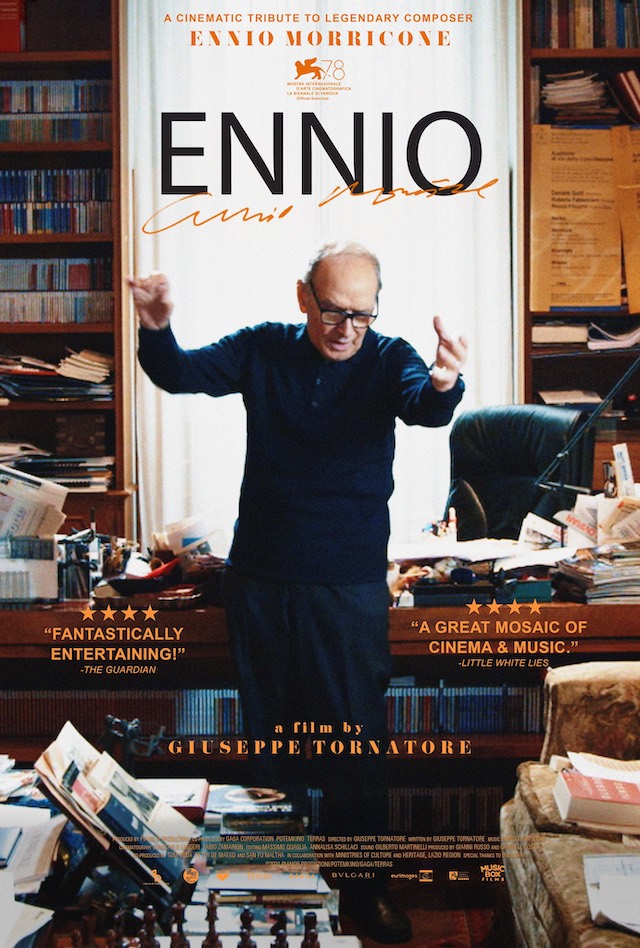
©Courtesy of Music Box Films.
“Ennio” (2021) is Giuseppe Tornatore’s cinematic ode to Ennio Morricone, a legendary film composer and orchestrator. The film invites us on an intimate journey through Morricone’s illustrious professional career and personal life, offering glimpses into his creative process and life history. The documentary paints a comprehensive and heartfelt portrayal of Morricone, whose artistry has left an enduring impact on the world of film music.
In simpler terms, it’s a delight to discover the inspirations behind the composer’s unique and mesmerizing music that has captivated billions of film enthusiasts for the past half-century. Even if you’re not a dedicated fan, there’s a good chance you’ve heard the iconic coyote-howl theme from “The Good, the Bad, and the Ugly.” The film delves into his incredibly prolific career, exploring his most celebrated scores across various genres, from spaghetti Westerns to crime thrillers. There’s much for Morricone to say about the creative process behind each film. Everyone involved speaks extensively about Morricone’s meticulous approach to his craft.
Mesmerizingly surprising is the maestro’s account of facing numerous challenges and conflicts during these processes, yet harnessing them to invent another writing style. He did not recoil from composing for film scores. His music articulates the characters in the films in a way that neither the plot nor other cinematographic elements could. He was conscious that adopting this approach was essential in crafting a film score and precisely what the filmmakers were requesting from him.

©Ennio Morricone in Ennio. Courtesy of Music Box Films.
With unwavering confidence in his own creations and in the power of music itself, Morricone crafted pieces that evoke a profound resonance and energy from the characters. It even surprised filmmakers who initially didn’t share the same wavelength with the composer, like Sergio Leone, one of his greatest collaborators. Morricone ingeniously crafted a genre-bending melody, seamlessly blending his previous score with the sound of the trumpet, in their first collaboration, “A Fistful of Dollars.”
Despite its over 150-minute runtime, which might be a bit intimidating, this comprehensive visual biography does not overwhelm us with an inundating sprawl of fact-telling. The film is a captivating assortment of innumerable interviews with Morricone and his collaborators, friends, and family, woven together with film clips and archival footage, while his scores play intermittently in the background.
It almost feels like watching a compilation video of his film soundtracks with behind-the-scenes accounts in between, especially when enthusiastic interviewees (including The Maestro himself) start humming tunes and mimicking instruments, syncing with his iconic melodies. This blending of the film’s visual and auditory elements weaves an invigoratingly fluid rhythm, much like Morricone’s own compositions.
Aside from the film’s harmonious flow, its treatment of the composer’s humanity gives the narrative an emotional arc, making the film even more engaging. Morricone often reflects on his internal struggles—his inferiority complex towards his peers at the conservatoire, conflicts with his dual professionalism as an experimental musician, and self-disappointment in consecutive misses of the Oscar. These crucial yet not overly dramatized sentimental accounts provide a more humanistic sense to this symbolic film-music persona, allowing us to embrace Morricone as one person with emotional depths like each of us.
In such an intimate way, “Ennio” is a captivating and heartfelt tribute to a maestro and his timeless melodies.

©Ennio Morricone in Ennio. Courtesy of Music Box Films.
Check out more of Mako Fukata’s articles.
Here’s the trailer of the film.
https://www.youtube.com/watch?v=q5WBbULw_0U

